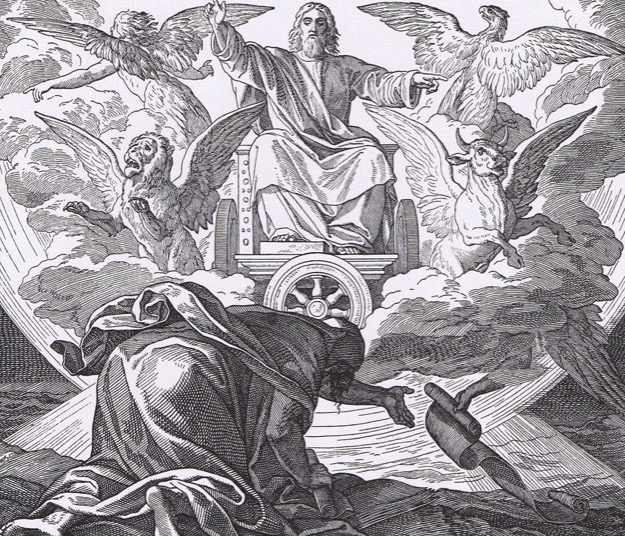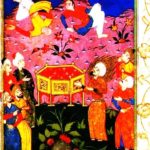All of the Islamic sources credit ‘Abd al-Muttlalib, the grandfather of Muhammad, with digging the Zamzam well. Several fanciful legends about the digging of Zamzam are recorded in the sira of Ibn Ishaq. They show that the Quraysh definitively had no memory of any well near the Kaaba prior to the digging of the Zamzam. This is remarkable and inexplicable given the history Muhammad credits to Zamzam and the Kaaba.
Here are the relevant passages:
While Abdu’l-Muttalib was sleeping in the hijr [an area between the Ka’aba proper and a semicircular area behind it], he was ordered in a vision to dig Zamzam. Yazld b, Abu Habib al-Misri from Marthad b. ‘Abdullah al-Yazanl from ‘Abdullah b. Zurayr al-Ghafiql told me that he heard ‘All b. Abu Talib telling the story of Zamzam. He said that ‘Abdu’l-Muttalib said:
‘I was sleeping in the hijr when a supernatural visitant came and said, “Dig Tiba”. I said “And what is Tiba?” ; then he left me. I went to bed again the next day and slept, and he came to me and said “Dig Barra”; when I asked what Barra was he left me. The next day he came and said “Dig al-Madnuna”; when I asked what that was he went away again. The next day he came while I was sleeping and said “Dig Zamzam”. I said, “What is Zamzam?”; he said:
’Twill never fail or ever run dry,
’Twill water the pilgrim company.
It lies ’twixt the dung and the flesh bloody,
By the nest where the white-winged ravens fly,
By the nest where the ants to and fro do ply.’
This bit of rhyming verse–unlike the Quran, it’s both rhyming and metered–is typical of the oracular and mystical poetry of the pagan Arabs. The “bloody flesh” indicated the location of animal sacrifices at the Ka’aba.
Muhammad makes a big point that the Quran is a true revelation from God because it is not metrical poetry but is instead rhyming prose. These traditions, with their metrical poetry, present a contradictory view of Allah and the nature of his revelations, but this is easily explained by it being an adaptation of a pagan story for post-Islamic times.
When the exact spot had been indicated to him and he knew that it corresponded with the facts, he took a pick-axe and went with his son al-Harith —for the had no other son at that time—and began to dig. When the top of the well appeared he cried ‘Allah akbar!’
Thus Quraysh knew that he had obtained his object and they came to him and said, ‘This is the well of our father Ishmael, and we have a right to it, so give us a share in it.’
‘I will not,’ he answered, ‘I was specially told of it and not you, and I was the one to be given it.’
They said: ‘Do us justice, for we shall not leave you until we have got a judicial decision in the matter.’ He said: ‘Appoint anyone you like as umpire between us.’
He agreed to accept a woman diviner of B. Sa’d Hudhaym, who dwelt in the uplands of Syria.
The story gets highly implausible here, with the pagan ‘Abd al-Muttalib giving a very pious and Islamic exclamation and then immediately deferring to the expertise of a pagan diviner to settle the dispute.
The actual nature of this dispute appears obscure here. Why would anyone care whether other people had a particular right to use the water of well? If Mecca was an established city, there would surely be other wells all around it!
However, that is exactly the issue. Mecca was not, in fact, an established city. The nearest wells were miles away from the Kaaba, which was the entire reason that the position of the siqaya and rifada existed. If pilgrims could easily get water for themselves at nearby wells while visiting the majid, they hardly needed a position dedicated to supplying them with water.
When the rest of the Quraysh demanded the right to use the well, they were also demanding the abolition of the role of siqaya, or water-bearer, for which ‘Abd al-Muttalib had previously received tribute. ‘Abd al-Muttalib, of course, had not dug the well so that he could lose a source of income but rather so that he could keep the siqaya money and not have to pay for water caravans from the wells that were miles away, so he protested this claim.
It’s especially important to realize how unimportant ‘Abd al-Muttalib was in the tribe at this point. He was likely the youngest of his father’s four sons, and the very name that he is most well known by was a kind of demeaning nickname. Most “Abd” names were theophoric, meaning “slave of” some god, but ‘Abd al-Muttalib’s name came from that of his uncle Muttalib–he was called the “slave” of his own uncle because he was orphaned at a young age and grew up in his uncle’s house. He only had one wife (who was an unimportant member of a non-Qurayshi tribe) and one son for many years, until after the digging of Zamzam, which changed his fortunes. But first, his ownership over the water had to be confirmed.
So ‘Abdu’l-Muttalib, accompanied by some of his relations and a representative from all the tribes of Quraysh, rode away. They went on through desolate country between the Hijaz and Syria until ‘Abdu’l-Muttalib’s company ran out of water and they feared that they would die of thirst. They asked the Quraysh tribes to give them water, but they refused, on the ground that if they gave them their water they too would die of thirst.
In his desperation ‘Abdu’l-Muttalib consulted his companions as to what should be done, but all they could do was to say that they would follow his instructions: so he said, ‘I think that every man should dig a hole for himself with the strength that he has left so that whenever a man dies his companions can thrust him into the hole and bury him until the last man, for it is better that one man should lie unburied than a whole company.’ They accepted his advice and every man began to dig a hole for himself. Then they sat down until they should die of thirst.
After a time ‘Abdu’l-Muttalib said to his companions, ‘By God, to abandon ourselves to death in this way and not to scour the country in search of water is sheer incompetence; perhaps God will give us water somewhere. To your saddles!’ So they got their beasts ready while the Quraysh watered them at work.
‘Abdu’l-Muttalib went to his beast and mounted her and when she got up from her knees a flow of fresh water broke out from beneath her feet. ‘Abdu’l- Muttalib and his companions, crying ‘Allah akbar!’, dismounted and drank and filled their water-skins. Then they invited the Quraysh to come to the water which God had given them and to drink freely.
After they had done so and filled their water-skins they said: ‘By God, the judgement has been given in your favour ‘Abdu’l-Muttalib. We will never dispute your claim to Zamzam. He who has given you water in this wilderness is He who has given you Zamzam. Return to your office of watering the pilgrims in peace.’
So they all went back without going to the diviner.
The story, as odd and anachronistic as it is, establishes the right of ‘Abd al-Muttalib to the money earmarked for the siqaya on the condition that the people actually living in the vicinity of Mecca have free use of the water of the Zamzam well. The siqaya money then became a kind of royalty on the well, and rather than having to spend the money entrusted to him as the siqaya on water-transport, ‘Abd al-Muttalib could invest it in caravans.
This arrangement immediately raised his position so much that he was able to marry a second wife from among the elite Quraysh, and he eventually became the head of the Hashim clan among the Quraysh and had a lifetime total of no less than six wives and at least eighteen children.
Another version of the legend is also record in Ibn Ishaq:
This is the story which I heard as from Ali b. Abu Talib about Zamzam and I have heard one report on ‘Abdu’l-Muttalib’s authority that when he was ordered to dig Zamzam it was said to him:
Then pray for much water as crystal clear
To water God’s pilgrims at the sites they revere
As long as it lasts you’ve nothing to fear.On hearing these words he went to the Quraysh and said, ‘You know that I have been ordered to dig Zamzam for you,’ and they asked, ‘But have you been told where it is?’ When he replied that he had not, they told him to go back to his bed where he had the vision and if it really came from God it would be made plain to him; but if it had come from a demon, he would not return to him.
So ‘Abdu’l-Muttalib went back to his bed and slept and received the following message:
Dig Zamzam, ’twill not to your hopes give lie,
’Tis yours from your father eternally.
’Twill never fail or ever run dry,
’Twill water the pilgrim company
Like an ostrich flock a fraternity,
Their voice God hears most graciously.
A pact most sure from days gone by
Nought like it canst thou descry,
It lies ’twixt the dung and the flesh bloody.It is alleged that when this was said to him and he inquired where Zamzam was, he was told that it was by the ants’ nest where the raven will peck tomorrow, but God knows how true this is. The next day ‘Abdu’l Muttalib with his son al-Harith, who at that time was his only son, went and found the ants’ nest and the raven pecking beside it between the two idols Isaf and Na’ila at which Quraysh used to slaughter their sacrifices. He brought a pick-axe and began to dig where he had been commanded.
Quraysh seeing him at work came up and refused to allow him to dig between their two idols where they sacrificed. ‘Abdu’l-Muttalib then told his son to stand by and protect him while he dug, for he was determined to carry out what he had been commanded to do. When they saw that he was not going to stop work they left him severely alone. He had not dug deeply before the stone top of the well appeared and he gave thanks to God knowing that he had been rightly informed. As digging went further, he found the two gazelles of gold which Jurhum had buried there when they left Mecca. He also found some swords and coats of mail from Qal’a.
Quraysh claimed that they had a right to share in this find. ‘Abdu’l-Muttalib denied this, but was willing to submit the matter to the sacred lot. He said that he would make two arrows for the Ka’ba, two for them, and two for himself. The two arrows which came out from the quiver would determine to whom the property belonged. This was agreed, and accordingly he made two yellow arrows for the Ka’ba, two black ones for himself, and two white ones for Quraysh. They were then given to the priest in charge of the divinatory arrows, which were thrown beside Hubal. (Hubal was an image in the middle of the Ka’ba, indeed the greatest of their images. It is that referred to by Abu Sufyan ibn Harb at the battle of Uhud when he cried ‘Arise Hubal’, i.e. Make your religion victorious!)
‘Abdu’l-Muttalib began to pray to God, and when the priest threw the arrows the two yellow ones for the gazelles came out in favour of the Ka’ba. The two black ones allotted the swords and coats of mail to ‘Abdu’l-Muttalib, and the two arrows of Quraysh remained behind. ‘Abdu’l-Muttalib made the swords into a door for the Ka’ba and overlaid the door with the gold of the gazelles. This was the first golden ornament of the Ka’ba, at any rate so they allege. Then ‘Abdu’l-Muttalib took charge of the supply of Zamzam water to the pilgrims.
In this version, there are plenty of anachronistic references to Allah, once again, as the tellers are clearly uncomfortable with the obviously pagan context of these occurrences. The nature of the dispute was altered, but the outcome was the same: ‘Abd al-Muttalib got to retain control of giving water to the pilgrims.
This story was clearly meant to support claims that the Zamzam well existed prior to ‘Abd al-Muttalib’s digging of it and to connect Muhammad’s family to the Kaaba by claiming that ‘Abd al-Muttalib created gilded iron doors out of the swords (something quite beyond the technology of Mecca at the time–the temperature required to get liquid iron at such a quantity would be impossible). According to Islamic sources, the Kaaba did not even have a roof at this time, so it seems odd that received a door.
There is a third version of the legend, still in Ibn Ishaq:
It is alleged, and God only knows the truth, that when ‘Abdu’l-Muttalib encountered the opposition of Quraysh when he was digging Zamzam, he vowed that if he should have ten sons to grow up and protect him, he would sacrifice one of them to God at the Ka’ba. Afterwards when he had ten sons who could protect him he gathered them together and told them about his vow and called on them to keep faith with God. They agreed to obey him and asked what they were to do. He said that each one of them must get an arrow, write his name on it, and bring it to him: this they did, and he took them before Hubal in the middle of the Ka’ba.
(The statue of) Hubal stood by a well there. It was that well in which gifts made to the Ka’ba were stored. Now beside Hubal there were seven arrows, each of then containing some words. One was marked ‘bloodwit’. When they disputed about who should pay the bloodwit they cast lots with the seven arrows and he on whom the lot fell had to pay the money. Another was marked ‘yes’, and another ‘no’, and they acted accordingly on the matter on which the oracle had been invoked. Another was marked ‘of you’; another ‘mulsaq’; another ‘not of you’; and the last was marked ‘water’. If they wanted to dig for water, they cast lots containing this arrow and wherever it came forth they set to work. If they wanted to circumcise a boy, or make a marriage, or bury a body, or doubted someone’s genealogy, they took him to Hubal with a hundred dirhams and a slaughter camel and gave them to the man who cast the lots; then they brought near the man with whom they were concerned saying, ‘O our god this is A the son of B with whom we intend to do so and so; so show the right course concerning him.’ Then they would say to the man who cast the arrows ‘Cast!’ and if there came out ‘of you’ then he was a true member of their tribe; and if there came out ‘not of you’ he was an ally; and if there came out ‘mulsaq’ he had no blood relation to them and was not an ally. Where ‘yes’ came out in other matters, they acted accordingly; and if the answer was ‘no’ they deferred the matter for a year until they could bring it up again. They used to conduct their affairs according to the decision of the arrows.
‘Abdu’l-Muttalib said to the man with the arrows, ‘Cast the lots for my sons with these arrows’, and he told him of the vow which he had made. Each man gave him the arrow on which his name was written. Now ‘Abdullah was his father’s youngest son, he and al-Zubayr and Abu Talib were born to Fatima d. ‘Amr b. ‘A’idh b. ‘Abd b. ‘Imran b. Makhzum b. Yaqaza b. Murra b. Ka’b b. Lu’ayy b. Ghalib b. Fihr. It is alleged that ‘Abdullah was ‘Abdu’l-Muttalib’s favourite son, and his father thought that if the arrow missed him he would be spared. (He was the father of the apostle of God.) When the man took the arrows to cast lots with them, ‘Abdu’l-Muttalib stood by Hubal praying to Allah. Then the man cast lots and ‘Abdullah’s arrow came out.
His father led him by the hand and took a large knife; then he brought him up to Isaf and Na’ila (T. two idols of Quraysh at which they slaughtered their sacrifices) to sacrifice him; but Quraysh came out of their assemblies and asked what he was intending to do. When he said that he was going to sacrifice him, they and his sons said ‘By God! you shall never sacrifice him until you offer the greatest expiatory sacrifice for him. If you do a thing like this there will be no stopping men from coming to sacrifice their sons, and what will become of the people then?’
Then said al-Mughira b. ‘Abdullah b. ‘Amr b. Makhzum b. Yaqaza, ‘Abdullah’s mother being from his tribe, ‘By God, you shall never sacrifice him until you offer the greatest expiatory sacrifice for him. Though his ransom be all our property we will redeem him.’ Quraysh and his sons said that he must not do it, but take him to the Hijaz, for there there was a sorceress who had a familiar spirit, and he must consult her. Then he would have liberty of action. If she told him to sacrifice him, he would be no worse off; and if she gave him a favourable response, he could accept it.
So they went off as far as Medina and found that she was in Khaybar, so they allege. So they rode on until they got to her, and when ‘Abdu’l-Muttalib acquainted her with the facts she told them to go away until her familiar spirit visited her and she could ask him. When they had left her ‘Abdu’l-Muttalib prayed to Allah, and when they visited her the next day, she said, ‘Word has come to me. How much is the blood money among you?’ They told her that it was ten camels, as indeed it was. She told them to go back to their country and take the young man and ten camels. Then cast lots for them and for him; if the lot falls against your man, add more camels, until your lord is satisfied. If the lot falls against the camels then sacrifice them in his stead, for your lord will be satisfied and your client escape death.’
So they returned to Mecca, and when they had agreed to carry out their instructions, ‘Abdu’l-Muttalib was praying to Allah. Then they brought near ‘Abdullah and ten camels while Abdu’l-Muttalib stood by Hubal praying to Allah. Then they cast lots and the arrow fell against Abdullah. They added ten more camels and the lot fell against Abdullah, and so they went on adding ten at a time, until there were one hundred camels, when finally the lot fell against them. Quraysh and those who were present said, ‘At last your lord is satisfied ‘Abdu’l- Muttalib.’
‘No, by God,’ he answered (so they say), ‘not until I cast lots three times.’ This they did and each time the arrow fell against the camels. They were duly slaughtered and left there and no man was kept back or hindered (from eating them).
This is a clear adaptation of the sacrifice of Isaac in the Hebrew scriptures, but it’s replete with interesting pagan details and so deserves to be recounted again here. Everything about the story has some level of absurdity, down to the assertion that ‘Abd Allah was ‘Abd al-Muttalib’s favorite son. ‘Abd Allah was married off to a penniless orphan at the same time that his father took her wealthier cousin in marriage; ‘Abd Allah’s entire wealth amounted to Amina’s bride-price and a single female slave; Muhammad’s childhood is an explicitly precarious and impoverished one; and even in his adulthood, Muhammad was unable to afford to marry at the age that other men did, and he ended up having to take a pre-Islamic form of marriage that gave his wife much more power than the standard patriarchal form of marriage.
At any rate, the reaction of the Quraysh in all the legends show no knowledge that the Zamzam well had existed before it was dug by ‘Abd al-Muttalib. This is very significant, and it undermines the reason the Kaaba is supposed to be holy to the Muslims as it was to the pagans.
The pre-existence of the Zamzam well is countered by Islam’s own sources
Islamic sources assert that the Zamzam well was dug to satisfy the thirst of Hagar, having previously been dug by no less than Abraham himself. This is a part of a series of stories that try to connect the Kaaba and its pagan contents to some form of legitimate monotheism in the Jewish tradition. Of course, this supposed origin is frankly impossible. Abraham never came within 600 miles of Mecca. But leaving these geographical absurdities aside, the story of the loss of the Zamzam is impossible to believe for the simple reason of human nature.
Islamic tradition claims that eleven generations before Abd al-Muttalib, Abd Manat ibn Kinanah and Ghubshan of Khuza’a conquered Mecca and took it from the control of the Jurhum tribe. In revenge, the Jurhum tribe filled up the well on their way out of the city.
Abd Manat and Ghubshan were supposedly among the Arabs who had been making pilgrimages to the Kaaba from time immemorial. They would have known about the Zamzam well. If it had been filled in, they would have simply dug it up again. If there was a town in the immediate vicinity of the Kaaba, it would have been dependent on the water from the Zamzam well. Otherwise, the town would have immediately become uninhabitable, because towns simply did not exist miles from the nearest well.
Instead, in the Islamic histories, everyone involved completely and instantly forgot the existence of the well upon taking over the Kaaba, and for eleven generations, there was no water available close to the Kaaba, requiring the office of the siqayya to bring water to the pilgrims. Only then is it miraculously dug again.
In fact, as the legends above show, it is forgotten so completely that the people mock and even threaten the man digging it. And then, suddenly, memory returns and everyone abruptly knows that the Jurhum tribe filled it in, after all.
Of course, the stories of Zamzam’s ultimate divine origins originate from Muhammad. That required coming up with a reason for Zamzam’s loss after the time of Hagar and Ishmael–which is where the story of the Jurhum tribe came in, since it was inconceivable that anyone would fill in their own well knowingly. However, this story is patently ridiculous, requiring the conquerors to all suffer a very specific bout of brain damage, but it was also necessary to fit with the established stories of Islam.





